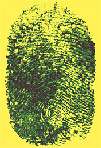Computerized fingerprint matching is accurate more than 99 percent of the time

Computerized systems that automatically match fingerprints have become so sophisticated that the best of them are accurate more than 99 percent of the time, according to the most comprehensive known study of the systems ever conducted. Computer scientists at the Commerce Department's National Institute of Standards and Technology (NIST) tested 34 commercially available systems provided by 18 companies from around the world. NIST conducted the testing to evaluate the accuracy of fingerprint matching for identification and verification systems.
While law enforcement agencies long have employed automated fingerprint matching devices, they are used increasingly in biometric systems to make national borders more secure. NIST conducted the study to fulfill requirements of the USA PATRIOT Act and the Enhanced Border Security and Visa Entry Reform Act.
The test used operational fingerprints from a variety of U.S. and state government sources. A total of 48,105 sets of fingerprints from 25,309 people, with a total of 393,370 distinct fingerprint images, were used to enable thorough testing.
The most accurate systems were from NEC of Japan, SAGEM of France and Cogent, an American company. The performance of these three systems was comparable. The performance varied depending on how many fingerprints from a given individual were being matched. The best system was accurate 98.6 percent of the time on single-finger tests, 99.6 percent of the time on two-finger tests, and 99.9 percent of the time for tests involving four or more fingers. These accuracies were obtained for a false positive rate of 0.01 percent.
Researchers found that the number of fingers used and fingerprint quality affected the accuracy of the systems. Prints from additional fingers greatly improved accuracy, and the greatest gains were seen when graduating from a single finger to two fingers.
The Justice Management Division of the U.S. Department of Justice funded the study in connection with its efforts to integrate the fingerprint systems operated by the Federal Bureau of Investigation and the Department of Homeland Security.
















